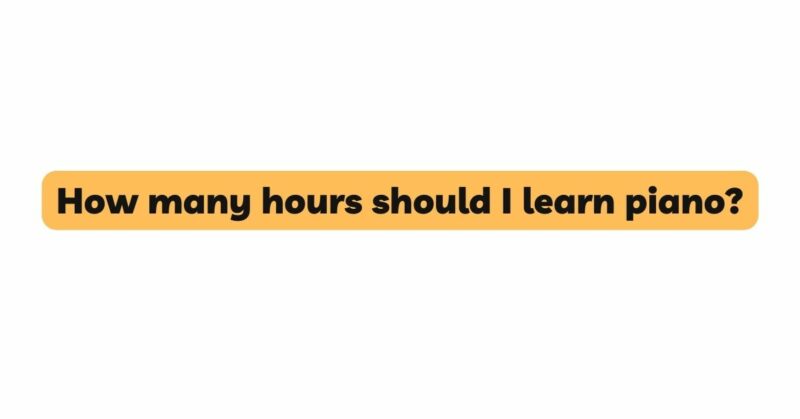Learning to play the piano can be a rewarding experience, but it also takes time and effort. One of the most important factors in learning piano is practice. But how many hours should you spend practicing the piano each day?
The ideal number of hours to practice the piano
The ideal number of hours to practice the piano each day depends on a number of factors, including:
- Your age: Young children may be able to practice for longer periods of time than adults, as they have more energy and are more likely to be motivated. However, it is important to make sure that children do not practice for too long, as this can lead to fatigue and even injuries.
- Your experience level: If you are a beginner, you may need to practice for more hours each day than if you are an experienced player. This is because beginners need to learn the basics of piano playing, which takes time and repetition.
- Your goals: If you have specific goals in mind, such as learning to play a certain piece of music or becoming a concert pianist, you may need to practice for more hours each day. However, it is important to listen to your body and not to practice to the point of exhaustion.
- Your schedule: If you have a busy schedule, you may not be able to practice for as many hours each day as you would like. However, even if you can only practice for a few hours each day, you will still see improvement over time.
How to make the most of your practice time
Here are some tips for making the most of your piano practice time:
- Set realistic goals: When you are practicing piano, it is important to set realistic goals for yourself. Don’t expect to learn a new piece of music overnight. Start with small goals, such as learning a new scale or practicing a difficult passage. As you progress, you can set more challenging goals.
- Focus on technique: When you are practicing piano, it is important to focus on your technique. This means practicing with good posture, using the correct fingerings, and playing with smooth, even motion.
- Vary your practice routine: To avoid boredom and plateaus, it is important to vary your practice routine. This means practicing different pieces of music, working on different techniques, and using different practice methods.
- Take breaks: It is important to take breaks when you are practicing piano. This will help you stay focused and avoid fatigue.
- Listen to yourself play: One of the best ways to improve your piano playing is to listen to yourself play. This will help you identify areas where you need to improve.
- Get feedback from others: If you can, get feedback from other piano players on your playing. This can be helpful in identifying areas where you need to improve.
- Have fun! Learning to play the piano should be enjoyable. If you are not having fun, you are less likely to stick with it. So relax, take your time, and enjoy the process.
Conclusion
There is no one-size-fits-all answer to the question of how many hours you should practice the piano each day. The ideal number of hours depends on a number of factors. However, by following the tips in this article, you can make the most of your practice time and improve your piano skills quickly and efficiently.


